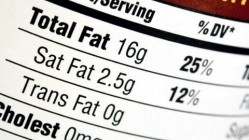Gulf multinationals commit to phase out trans fats by 2019

General Mills, Kellogg, Mars, Mondelēz, Nestlé, PepsiCo, Coca-Cola and Unilever—each GCC-based member companies of the International Food and Beverage Alliance—have agreed a common global objective to reduce trans fatty acids in their products to nutritionally insignificant levels worldwide by the end of 2018 at the latest.
In the GCC, the companies will voluntarily reformulate their products to remove partially hydrogenated oils—the major source of trans fat in processed foods—and increase the use of healthier fats, such as mono- or polyunsaturated fatty acids.
This is part of an ongoing effort by the companies to reformulate for healthier options, including the reduction of salt, saturated fat and sugar, reducing portion sizes, and providing of product alternatives with lower calories.
The World Health Organisation’s global action plan for the prevention and control of non-communicable diseases calls on member states to implement policies to replace industrially produced trans fatty acids with unsaturated fats. This new commitment reflects support for this recommendation among products sold and manufactured in the GCC.
Reducing the intake of industrial trans fats to nutritionally insignificant levels has been identified as a priority in public health nutrition in the Gulf. The signatories said they believe their commitment will encourage the broader industry to work for the same goal, and to work to define effective measures to ensure a level playing field.
Driving forward product formulation and innovation is one of four IFBA global commitments being implemented by member companies in the GCC.
Earlier this year, the member companies also launched an enhanced version of their existing GCC pledge on responsible food and beverage marketing to children, which was first adopted in 2010.
These companies do not direct any marketing communications to children below 12 years old, except for products that fulfil specific nutritional criteria based on sound scientific evidence. In addition to a commitment on marketing to children, the other commitments include providing nutrition information to consumers, including implementing fact-based nutrition labelling, and promoting healthy diets and lifestyles.















